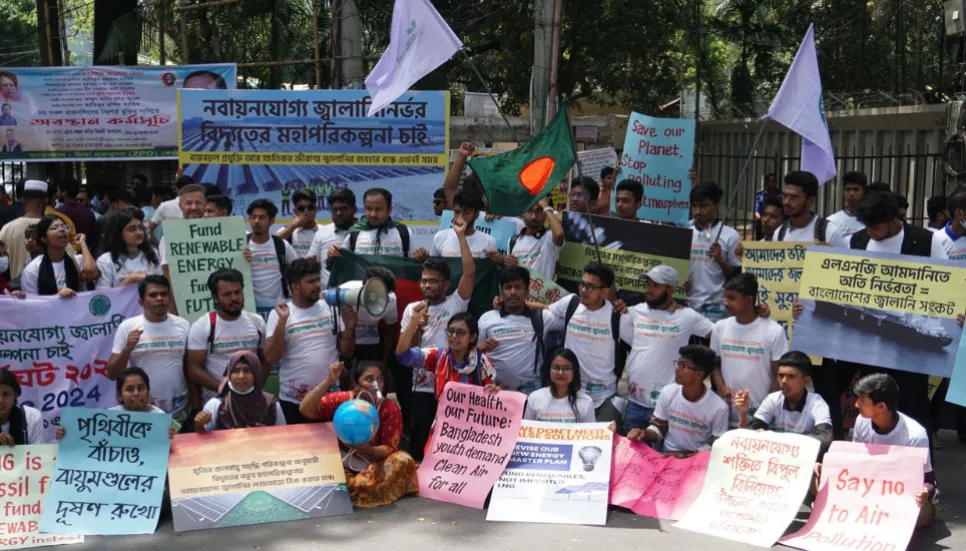
Amidst the 57th annual meeting of the Asian Development Bank (ADB) from Thursday to Sunday, in Tbilisi, Georgia, YouthNet for Climate Justice – a grassroots youth led platform – has issued a resounding call for robust climate safeguards within the bank's policies and investments.
Citing the urgent need to prioritise accuracy, transparency, and decisive action in addressing climate change, the organisation's press statement underscores the critical role of the ADB in confronting the pressing challenges of our time, reads a press release.
Under the theme "Bridge to the Future," the four-day event has attracted a diverse array of participants including ADB senior management, policymakers, private sector representatives, and leading development experts from across the region.
As the annual meeting progresses, all eyes are on the ADB to showcase leadership in confronting the climate crisis and forging a path towards a more resilient and equitable future in the Asia-Pacific region.
Executive Coordinator of YouthNet Sohanur Rahman emphasised the urgency of addressing climate change and underscored the critical role of the ADB in fostering sustainable development.
Sohanur, underscoring its critical role in Asia's sustainable future, said, "The just transition is pivotal in Asia, ensuring climate action respects labour and human rights, preventing further inequalities. It safeguards workers' rights amid shifts to sustainable economies, creating green jobs and minimising vulnerability."
He further mentioned, "We cannot ignore the profound impacts of climate change on vulnerable communities and ecosystems. Harnessing that opportunities are emerging to create green jobs, and to minimise the effect of job losses especially on the vulnerable, this includes many young people.
“The ADB holds significant influence in driving sustainable development in the region, but it must do so with a firm commitment to climate justice and equity."
Recent analyses, including a study conducted by Oxfam, titled "Unaccountable Adaptation: The Asian Development Bank's Overstated Claims on Climate Adaptation Finance," have sparked concerns regarding the accuracy and transparency of the Asian Development Bank's (ADB) reporting on climate finance.
The study claimed a potential over-reporting of assessed projects by 44 per cent, estimating climate adaptation finance at $0.9 billion rather than the reported $1.7 billion. Despite these claims, the ADB has stood firm, reaffirming its figures and asserting confidence in its methodology.
The bank remains committed to delivering $100 billion in climate financing by 2030, with $34 billion allocated for adaptation and resilience efforts.
YouthNet has outlined a comprehensive set of demands aimed at strengthening the ADB's climate safeguards. Central to their advocacy is the alignment of ADB policies with the ambitious targets of the Paris Agreement, aiming to limit global warming to 1.5°C.
They also call for heightened ambition in climate safeguard standards, surpassing those of other multilateral development banks, to ensure robust protection against climate risks.
Furthermore, YouthNet emphasises the urgency of closing fossil fuel loopholes, advocating for the cessation of investments in gas and captive coal. They stress the importance of rejecting false climate solutions and prioritising investments in genuinely renewable energy projects and just transition.
Gender-specific safeguards to address the disproportionate impacts of climate change on women and girls, as well as the protection of indigenous peoples' rights, including their right to free, prior, and informed consent in ADB-funded projects, are integral components of their recommendations.
These demands reflect the growing consensus among youth advocates that climate action must be bold, equitable, and grounded in principles of justice. As the ADB deliberates its future course of action, the voices of young people are calling for urgent and meaningful change.
Sohanur Rahman said, "We are prepared to collaborate with the ADB and other stakeholders to advance climate justice and forge a sustainable future for all but this necessitates genuine commitments to transparency, accountability, and the rights of the most vulnerable communities."
While Southeast Asia is grappling with a brutal heatwave as record-high temperatures have led to school closures and triggered urgent health warnings, the urgency of addressing climate change is paramount.
Large swathes of South and Southeast Asia are sweltering through a heatwave that has topped temperature records from Bangladesh to Myanmar to the Philippines.
With the Asia-Pacific region facing an escalating climate crisis, the organisation stresses the critical need for accuracy, transparency, and decisive action in addressing climate change.